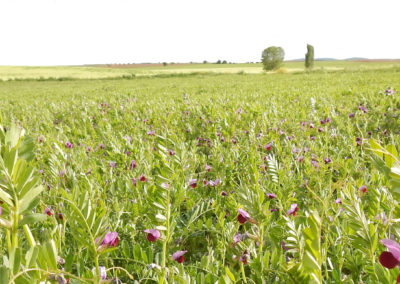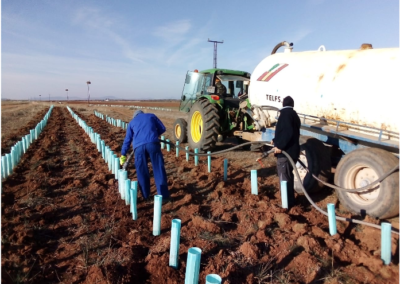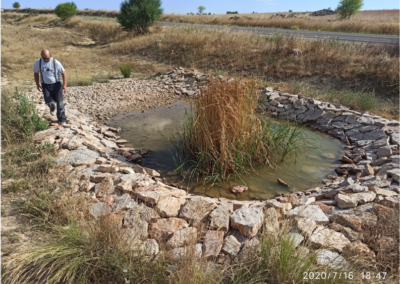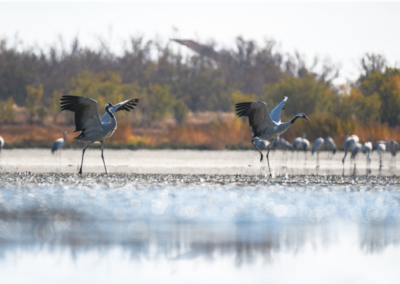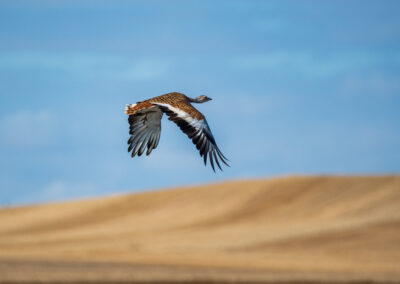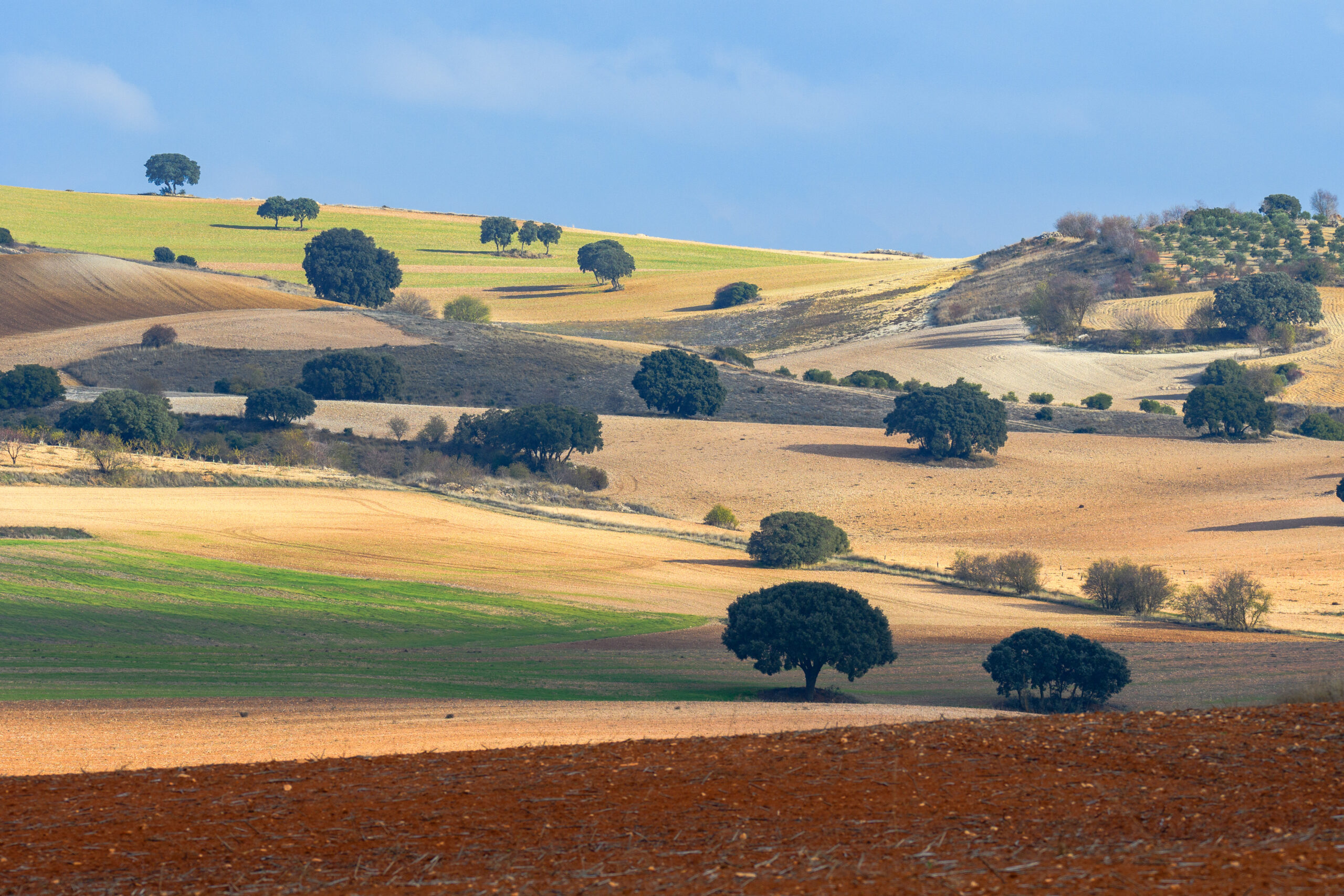
Project:
Conservation of
the Iberian Steppes
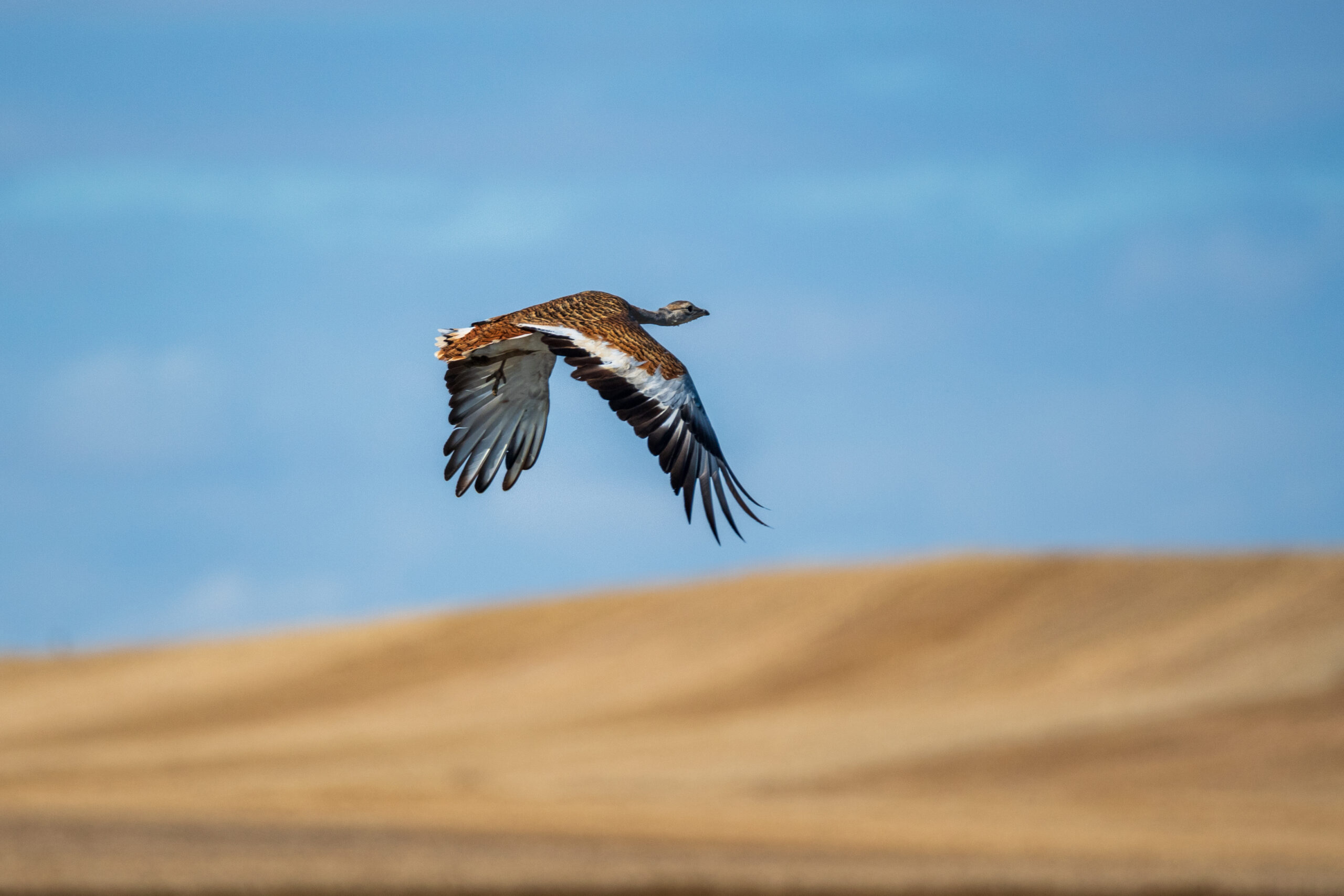
Location
Castilla-La Mancha, Spain
Funding
Micro donations from passengers visiting the 80+ bars and restaurants in 12+ airports in Spain, operated SSP Spain, experts in creating and running food outlets where people are on the move.
Practice
The conservation, restoration and economic development of Iberian Steppes through sustainable agriculture, with traditional rainfed cereal crops. To this end, a land stewardship network is created, signing agreements with local farmers.
Facts & Figures
- Agreements were signed with more than 300 farmers on 16’000 hectares.
- 2’800 trees planted by 2023, capturing CO2, offering protection to steppe birds and insects and absorbing access fertilisers and pesticides.
- The creation of 70 hectares of fallow land (untouched nature) as a refuge for endangered species.
- The construction of 10 new water ponds to counter the lack of water during the dry summer months.
- The recovery of 300 hectares of legume crops, fixing nitrogen, improving the soil and generating extra income for farmers.
- We are preserving 200 hectares of feeding areas for cranes.
About the Project
Spain is home to the most significant extension of steppe habitats in the European Union.
Iberian steppes are home to the world’s largest population of birds like the Great Bustard, home to more than 90% of the Sandgrouses of the European Union, apart from hundreds of unique species of plants and insects.
The steppes are being destroyed at a rate higher than any other Iberian ecosystem, as a result of agricultural intensification and the construction of solar and wind farms. It causes a catastrophic decline of numerous species of fauna and flora and releases tons of CO2 into the environment.
Fundación Global Nature develops in Castilla-La Mancha a strategy for the conservation and profitability of this model of sustainable agriculture, with traditional rainfed cereal crops. To this end, it maintains a land stewardship network, signing agreements with more than 300 farmers on 16,000 hectares. Many actions are implemented together with farmers, such as the recovery of fallow lands, rotations with legumes, differentiated commercialisation of organic legumes, support for sheep and goat shepherds, the recovery of hedges and boundaries, the purchase of pastures of high natural value or the compensation to farmers for the damages caused by the presence of cranes.
By helping to restore this unique ecosystem, farmers will become landscape stewards, learning how to implement sustainable farming techniques and improve the health of our planet.
The objectives are to protect steppe birds and their habitats, reduce the release of CO2 and increase biodiversity by conserving the steppes of Castilla-La Mancha together with 300 farmers.
SSP The Food Travel Experts engages in a micro-donation initiative inviting their customers to round up their purchases in their 80+ bars and restaurants in 12+ airports in Spain to help fund this project.
Project Update:
What we are working on: Fallow lands
One of the most effective and best-proven measures for the conservation of steppe birds, insects and threatened plant species is fallow lands management. Fallow lands (untouched nature) are part of the rotation of farmlands that are left with no agricultural production to recover nutrients and control weeds. Spanish farmers have been using fallow as an agronomic tool for centuries, resulting as a nesting site, feeding area or refuge for many species, especially endangered flora, insects, reptiles or birds. However, this type of agronomic management has been lost or used as “white fallow”, which leaves soils without any vegetation cover, lacking any ecological value.
Targets
- 70 hectares of fallow lands to conserve the habitats of bio-indicator birds like the Little Bustard, Great Bustard and two species of Sandgrouse
- 10 steward farmers will support this initiative.
Wild birds are a good, visible and audible sign of ecological health (bio-indicators). Farmers play a significant role in restoring ecosystems. Conservation and agriculture have to reinforce each other. There is simply not enough protected land on the planet to conserve diversity so we need to combine conservation with landscapes that people depend on for their livelihood. Birds are a goal AND proof of concept of nature inclusive agriculture. Besides that, grasslands purify water, fix nitrogen in their roots and absorb carbon.
Coming Soon
Once this first phase is completed, the focus will be on the recovery of legume crops. Legumes fix nitrogen naturally, so they have traditionally been alternated and included in rotations of cereal crops. They consume little water and are adapted to dry climates. They are also a fundamental source of protein for many species of birds and insects. Agricultural intensification has led to their abandonment, increasing the use of chemical fertilizers. Fundación Global Nature donates legume seeds to farmers in order to recover these traditional rotations.
“Spain is home to the largest extension of steppe habitats in the European Union. These open landscapes are the result of centuries of human activity. The traditional cereal crops in the centre of the Iberian Peninsula result in a steppe-like habitat and are the last open areas where we can find unique bird species, associated with these farmlands. Natural steppes have already disappeared in the rest of Europe, that´s why the Iberian steppes are home to the world’s largest population of the Great Bustard and the largest European population of its smaller relative, the Little Bustard. I am very excited about this collaboration with Zero Impact to use regenerative farming techniques to conserve and restore these ecosystems.”
Fundación Global Nature is one of the reference entities in the conservation of wetlands and farm environments of high natural interest. Since 1993, this Foundation has developed projects with regional governments, municipalities, farmers’ associations, ranchers, hunters, companies and research centres, always in order to generate collaborative solutions that combine ecological restoration with rural development.

Eduardo de Miguel Beascoechea
CEO Fundación Global Nature

